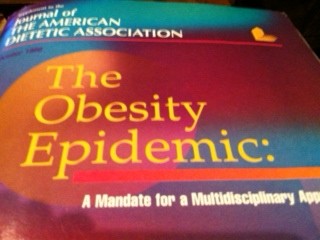Nutrition is a tricky business. Everyone eats, and everyone has an opinion about what the best diet is, or which foods or beverages you should or shouldn’t eat. On top of this there’s the dietary supplement market – a multimillion dollar industry that’s poorly regulated.
Chew the Facts® stands for science. I’m passionate about helping consumers distinguish facts from myth. With daily headlines focusing on soundbites from the latest dietary study, even health professionals can be misled or get confused. 
Every study isn’t a good study, nor a conclusive one. I had the chance to interview Kevin Klatt about how to review the science. Kevin is a PhD Candidate in Molecular Nutrition at Cornell University, Division of Nutritional Sciences. Here’s what Klatt had to say about how to decipher the meaningful research from everything else.
What resources should dietitians use when validating research or nutrition topics in the news?
 Nutrition topics in the news are often subject to ‘single study syndrome’ – the results get heavily publicized and spiced up, but are not placed into the context of the greater body of evidence. I think that its key for RD/RDNs to immediately ask themselves, “What do we know and how does this new research fit into what we knew before”. Apart from the occasional landmark trial, such as the recent peanut allergy prevention trial (the LEAP trial), few studies wildly transform our knowledge on a topic. Going to the Academy’s Evidence Analysis Library, the USDA’s Nutrition Evidence Library, the Agency for Healthcare Research and Quality’s database and Cochrane’s Library are great places to start when finding out what we (think we) know about a topic and contextualizing new research. In addition to these, there are many websites/blogs which get ‘fast takes’ from experts (sites such as the Science Media Centre and Health News Review are two examples) which RD/RDNs might consider in their analysis.
Nutrition topics in the news are often subject to ‘single study syndrome’ – the results get heavily publicized and spiced up, but are not placed into the context of the greater body of evidence. I think that its key for RD/RDNs to immediately ask themselves, “What do we know and how does this new research fit into what we knew before”. Apart from the occasional landmark trial, such as the recent peanut allergy prevention trial (the LEAP trial), few studies wildly transform our knowledge on a topic. Going to the Academy’s Evidence Analysis Library, the USDA’s Nutrition Evidence Library, the Agency for Healthcare Research and Quality’s database and Cochrane’s Library are great places to start when finding out what we (think we) know about a topic and contextualizing new research. In addition to these, there are many websites/blogs which get ‘fast takes’ from experts (sites such as the Science Media Centre and Health News Review are two examples) which RD/RDNs might consider in their analysis.
What questions should dietitians be asking when reading research studies?
I ask myself a few core things when reading research studies:
- What type of study is this? Where does it fall in the evidence hierarchy (e.g. meta analyses, trials, observational, animals/cells, etc)? Is the evidence causal and what level of bias is in the study?
- What hypothesis is being tested and was it preregistered? Pre-registry is important for ensuring that authors are reporting on what they designed the study to assess; studies which aren’t preregistered or are reporting on un-registered outcomes exhibit a higher risk of providing false positive/biased findings.
- What outcomes were measured? How meaningful are these (both scientifically and to your patient/client)?
- What is the most ideal study design to answer this question? Did the authors of this paper employ that design?
- What conclusions can we draw from this study, given its strengths and limitations?
- How does this research fit into the greater body of evidence surrounding this topic? I often do that by identifying systematic reviews and meta analyses, as well as some narrative reviews by experts in the field, regarding the issue.
- The last but most important thing that I ask myself is: “Is this something that patients/clients would find meaningful/valuable?”.
Increasingly, we’re seeing more systematic looks at the evidence, and the news is reporting on systematic reviews and meta-analyses. This is generally a good thing, because it reduces bias in the assessment of the literature, relative to more narrative reviews written by experts. Understanding how to interpret systematic reviews and meta-analyses is critical. Some tools for assessing the quality of this kind of research are the Cochrane Handbook and the AMSTAR quality assessment tool.
Where is the best place to find the best nutrition research?
The Academy of Nutrition and Dietetics and the American Society of Nutrition journals are go-to reads for RD/RDNs. Relevant trials and cohort analyses are often published in specialty journals and there might be some additional trials which are published within these (e.g. American Heart Association journals for Cardiology focused RD/RDNs). Members of these societies will have access to these journals. The UAB Obesity and Energetics Offerings is additional resource; they do a great weekly roundup of research in the field that I highly recommend following: https://obesityandenergetics.org/
The National Academies of Medicine (formerly the Institute of Medicine) also regularly puts out reports related to nutrition and health. These reports provide a wealth of information and are often the basis of public policy – and they are freely accessible! I’m a huge advocate for going back and reading old NAM/IOM reports and keeping up with the news – it’ll give you the most well rounded perspective on evidence-based nutrition.
For those without a university library subscription services, probably the best place to find emerging nutrition research is through social media – a number of groups/pages on Facebook and accounts on twitter post and discuss current research, and kind folks may even email you a pdf of the paper! Nutrition & Dietetics is so broad and interdisciplinary; social media can definitely help find others in your research niche.
Lastly, podcasts are fast becoming a great place to hear about research. Individual science podcasts often discuss research, and many journals have started to do podcasts with authors. There’s a ton of podcasts to explore but I’d specifically recommend the Sage Nutrition and Dietetics podcasts for updates from Nutrition in Clinical Practice and the Journal of Parenteral and Enteral Nutrition.




